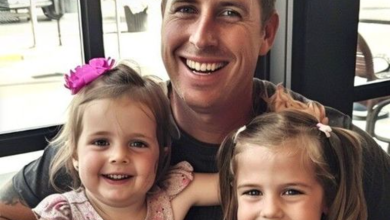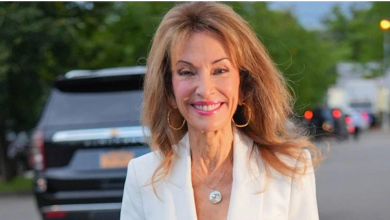Billy Connolly Reveals Robin Williams’ Heartbreaking Final Words 10 Years Later – You Won’t Believe What He Said
Robin Williams’ death deeply saddened fans all over the world. Recently, one of his closest friends shared the touching final words the beloved actor said, giving a peek into his last moments.
Robin Williams was known for his amazing performances in movies. He was nominated for Academy Awards for Best Actor for his roles in “Good Morning, Vietnam” (1987) and “The Fisher King” (1991). He won the Academy Award for Best Supporting Actor for his unforgettable role in “Good Will Hunting” (1997).
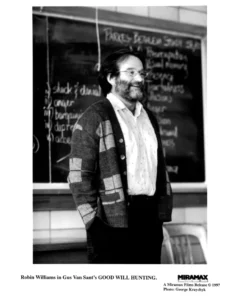
Despite his successful acting career, Robin Williams struggled with personal issues like alcohol addiction. In 2014, he spent a few weeks at the Hazelden facility in Minnesota to work on his sobriety.
This stay was planned in advance and not due to a relapse. His representative explained, “After working on several projects in a row, Robin is using this time to focus on and strengthen his commitment to staying sober, which he is very proud of.”
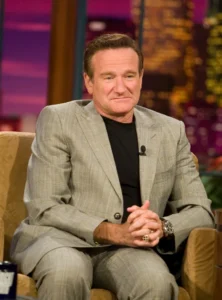
In an August 2014 interview with Diane Sawyer, Robin Williams talked about his struggle with alcohol abuse. He shared how he had relapsed after being sober for 20 years, explaining that it happened slowly over time.
Williams described it as a quiet, tempting voice that urged him to “jump” off the edge. He likened this voice to the temptation of having just one more drink, which he admitted was impossible for him to resist.
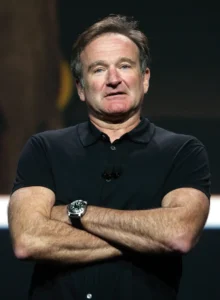
Robin Williams had struggled with alcoholism and cocaine abuse in the early 1980s but quit after his friend John Belushi died of an overdose in 1982. He stayed sober for 20 years. Williams explained that his relapse wasn’t triggered by any specific event, saying, “Addiction is not caused by anything, it’s just there.”
Williams, who starred with Sally Field in “Mrs. Doubtfire,” described addiction as something that lies in wait, ready to come back when a person feels they are doing well. He noted that things can seem fine one moment and then suddenly not be okay.
Tragically, Robin Williams passed away on August 11, 2014, at the age of 63, in what was reported as a suicide at his home. Marin County Police in California responded to an emergency call around noon and pronounced him dead shortly after.
Williams’ publicist revealed that he had been “battling severe depression” before his death. Later, his widow, Susan Schneider, shared more details about his passing.
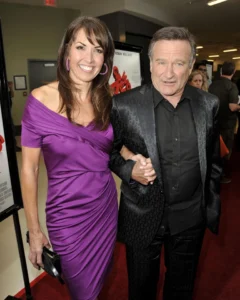
Susan Schneider discovered a disease that had deeply affected their lives, called Lewy body dementia (LBD), which she had never heard of before. An autopsy in October 2014 revealed that Robin Williams had been suffering from this condition.
“Before he passed, he was diagnosed with Parkinson’s, but that was just the beginning,” Schneider explained.
Williams had been misdiagnosed in May 2014, as doctors struggled to identify the cause of his significant changes in memory, movement, personality, reasoning, sleep, and mood. Despite many tests, the real issue remained hidden.
Schneider described discovering LBD as finding the source of his suffering, saying, “None of the doctors knew this hidden disease was causing all these problems. When we finally found out, it felt like discovering the name of my husband’s killer.”
A decade after Williams’ death, his friend, Sir Billy Connolly, has talked about their friendship. In an interview, Connolly shared that he knew Williams very well.
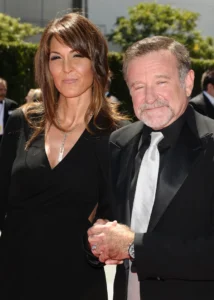
Billy Connolly and Robin Williams first met in the 1970s backstage on a talk show in Canada. They stayed in touch over the years, and Williams even visited Connolly at his home in Scotland during the holidays.
Connolly later found out that Williams also had Parkinson’s disease, like him. In an October 2021 interview, Connolly spoke about how Parkinson’s affects his daily life, saying, “There are good days and bad days, but the good days are more common. So, I have nothing to complain about.”
When asked if he would have changed anything if he had known Williams was planning to take his own life, Connolly said he wouldn’t have done anything differently. “You have to respect that someone is wise enough to make their own decisions,” he said. Connolly added that he wouldn’t have tried to save Williams’ life.
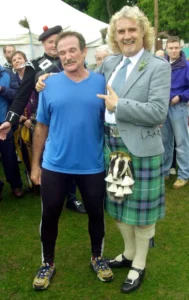
In a September 2014 interview, Billy Connolly talked about Robin Williams, saying, “He wasn’t always depressed. He was a complicated man but a beautiful person. He was a joy.”
Connolly shared that he and Williams often talked about their experiences with Parkinson’s disease over the phone. They were both dealing with early onset of the disease, and Connolly compared it to having a constant threat nearby. They regularly reminded each other of their deep friendship and told each other “I love you” many times.
Connolly recalled that Williams called him the week of his death, inviting him to dinner. During the meal, Williams made a heartfelt statement. On the BBC program “In My Own Words,” Connolly described their friendship as “lovely” and mentioned that Williams helped him feel less “alone” in the comedy world.
During their final dinner, Williams told Connolly, “I love you.” Connolly responded, “Thanks very much,” and Williams asked, “Do you believe me?” Connolly said, “Of course I do,” and Williams repeated, “Believe me, I love you.”
Connolly found it strange that Williams expressed such deep feelings, noting, “It was weird for him to say that, it’s not like his usual.” Williams passed away that weekend.
Connolly believes this was Williams’ way of saying goodbye. He added, “It was a sad day because I saw his whole career and it was stunning. He was like a rocket-ship, just took off. He was the best ever.”
Social media users reacted strongly to Robin Williams’ last words. One person simply wrote, “So sad.” Another expressed concern, saying, “Robin Williams wasn’t understood and wasn’t listened to. Anyone who needs to talk should have an ear.” A third user commented, “It is very difficult to read, heartbreaking.”
Robin Williams’ life and career had a profound impact on many people. His final moments with close friends highlighted the depth of his emotional struggles. Despite the sadness, his legacy as a brilliant comedian and caring individual continues to inspire and resonate with fans around the world.


